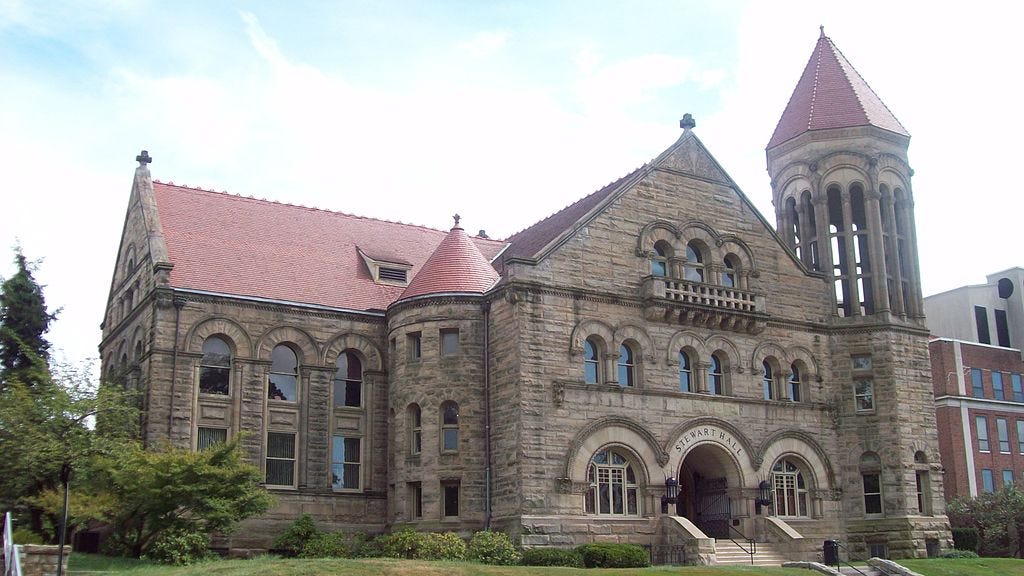Regarding Education, We Haven't Learned A Thing
From the WVU-Gee mess, to the governor's race, to social media, the more things seem to change in educational affairs in West Virginia the more they stay the same
All due respect to our friends in green and white scattered up and down 5th Avenue in Huntington, but it does mean something when folks refer to West Virginia University as the flagship education institution in the state. Or at least, it should. The recent and increasingly ugly situation in Morgantown has not only been terrible for the faculty, students, and staff whose jobs, financial situations, and future are on the line but also embarrassing for the state, for which WVU is the public embodiment to most of the wider world. The debate rages about the fiscal realities of a changing world, the leadership of Gordon Gee, enrollment levels, funding, and on and on the list of issues and challenges for higher education at West Virginia’s land grant, R1 university.
At the Greenbrier Resort at the end of August the GOP Gubernatorial candidates gathered for a forum where they answered questions and had their first public don’t-call-it-a-debate discussion on issues. Education came up, and the buzzwords began to flow. School choice, parents’ rights, accountability, and making things better, with variations on education’s importance to the future. The fact that after 100 years of Democratic control, and now several cycles of being one of the most Republican states in America, West Virginia is still at the bottom of any meaningful education rankings despite that change in political control, didn’t come up.
Meanwhile in Philippi, Alderson Broaddus is shutting down and liquidating its remaining assets through bankruptcy after years of mismanagement and debt. Elsewhere, the Hope Scholarship program is growing, while questions of transparency and guardrails start to creep up as schools openly advertise for the funds and some of the taxpayer funds are finding their way outside the state. All the while only 21% of West Virginia eighth graders are reading at or above a proficient level, and 40% are below a basic level.
There is a thread to all these headlines, stories, narratives, and discussions: when it comes to education in West Virginia, elected leader rhetoric and news media coverage is heavy on the buzzwords and activity, and light on accountability and actual achievement.
School choice is a fine thing, a necessary thing in many places and circumstances, but also is far from a cure all to what ails the Mountain State’s schools. Even with expansion, only five percent of West Virginia students are in private or non-public schools. The nature of private and charter schools will gravitate towards places with the population and economic means to support and sustain them. Which means the same areas struggling with education opportunity and funding now will probably continue to do so since the best intended buzzwords can’t change demographic changes and geographical realities. The buzzword needs more than just a slogan to affect more than just the students who already have options.
The problems in higher education also have an accountability problem. Whatever you think of WVU’s plans to right the budget, there is no version of events that doesn’t implicate current leadership. All West Virginia’s colleges and universities should have plans for declining enrollment, budget austerity, and some basic management of funds and resources to ride out hard times. The idea that the credentialed heads of institutions of higher learning are somehow excused and forgiven for not understand the basic tenets of “trees don’t grow to the sky” when it comes to business and revenue strains credulity and insults the taxpayers, students, alumni, and donors that feed the education machine.
Like many complex problems, the issues of education in West Virginia from toddlers to post-grads requires more “all of the above” answers and less focusing on just one pet issue in the pile of problems. Tighter, specific, focused legislation that sends funds where they are supposed to go and has mechanisms for transparency and accountability for when they do not. University and college heads who are not immune from criticism and are held to a leadership standard and performance that they would demand of an undergrad student in their studies. Politicians and commentators that go beyond just buzzwords and viral sayings and take the time to understand the issue, identify problems, and actually try to solve them for the citizens of the state, not just tickle the ears of constituents in an election year.
All West Virginians have to own, from those decades at the bottom of the education lists, that just talking about it, bemoaning it, and throwing more money and rhetoric at it isn’t going to change it. Because it hasn’t. At some point a rising generation of West Virginians is going to notice that those who came before proved to be text book hypocrites when it came to education; despite all evidence to the contrary, they kept doing the same thing over and over that had been proven not to work. When it comes to education, despite all the words and well-meaning intentions, our actions show we haven’t learned a thing.
Originally published in The Fayette Tribune September 14th, 2023





